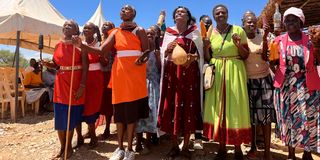From victims to voices: Baringo women lead peace efforts in banditry-prone zones

Ilchamus women dance in Ng'ambo, Baringo County. Women from the community have joined their Endorois counterparts to promote peace and end banditry and cattle rustling.
What you need to know:
- In Baringo, women lead peace efforts to curb banditry worsened by climate change and scarce resources.
- Amid rising climate-induced conflicts, they push for inclusion in peacebuilding, transforming county's response to violence.
For several decades, Baringo County has been prone to conflicts due to rampant banditry that has resulted in loss of lives and destruction to property.
Banditry has been attributed to cattle rustling and the fight for pasture and water. During attacks, women and children are the major casualties, with some being killed, injured, and widowed or orphaned.
However, a shift is underway. Women from the Endorois and Ilchamus communities now play a leading role in peacebuilding efforts. Jane Kiptanui says climate change affects availability of pasture and water and has been a key contributor to conflicts. She says women lead the charge in promoting peace.
“We normally hold joint peace caravans to preach peace. We emphasise the need for peaceful co-existence,” Jane said during the launch of a report on women’s role in peacebuilding amid climate-induced conflicts in Baringo County.
Their efforts focus on banditry hotspots, with a view to helping reform cattle rustlers. They partner with religious leaders to hold crusades and prayer sessions targeting to reform known ring leaders. The report by the Africa Centre for Sustainable and Inclusive Development lifted the lid off the critical but often overlooked role of women in peacebuilding. It indicates that climate change is a significant driver of conflict, particularly among pastoral and indigenous communities, who heavily rely on natural resources for their livelihoods.
Jane said the women lead community dialogues to sensitise residents to the negative effects of banditry and why it should be stopped. “We also push for women to be included in peace committees. I am happy that we now have several women in those committees. Being the greatest casualties of these conflicts, they have a lot to offer in coming up with lasting solutions.”
Women face numerous challenges based on gender norms and customs, hindering their participation in peacebuilding. The survey found that cultural beliefs significantly influence their mobility and decision-making autonomy. Traditionally, women in these communities lacked a direct voice in conflict resolution or decision-making. Married Ilchamus, for example, had limited freedom. They primarily left their homes to fetch water and firewood, or tend livestock. The survey indicates that destruction of infrastructure, such as hospitals and schools, disproportionately hurts women and children.
Juliet Ogubi, the lead researcher in the study, said the findings show women are never present in peace committees despite being the most affected by conflicts. She attributed this to patriarchy and social norms that do not allow women to talk in front of men. Women interviewed during the survey expressed their wish to be involved in peace committees, she added. “The women said they want to be at the negotiating table. During peace meetings, women want to be involved.”
She further stressed the need to focus on behavioural change among men. Homa Bay Senator Moses Kajwang’, the chair of the Parliamentary Caucus on Climate Action who attended the launch, said men are the greatest instigators of conflicts that hurt women and children more. To minimise climate-induced conflicts, he emphasised the need to make women the guardians of natural resources.
“Cattle rustling affects women and children more than me. There is, therefore, a need to bring women into peacebuilding efforts as peacemakers, mediators and peacekeepers. We need to ensure more investments in women and their peacebuilding efforts,” Moses said.
Salome Owuonda, the executive director of Africa Centre for Sustainable and Inclusive Development, said the voice of women in peace efforts has largely been sidelined. She said women should not be left out, as they, alongside children, bear the brunt of conflicts. She committed to ensuring the survey’s recommendations are implemented.
“We are going to work with all state and non-state actors. We will, in particular, work with the County Government of Bringo to cascade its implementation to the community level,” she said.
Dr Pacifica Ogolla, the director of Climate Change directorate, lauded the organisation for conducting the study. She said her department is coordinating climate change actions to help build climate resilience to avert climate change-related conflicts. “Investing in local climate resilience efforts is paramount. We also need to scale up investment in gender-inclusive climate actions.”


